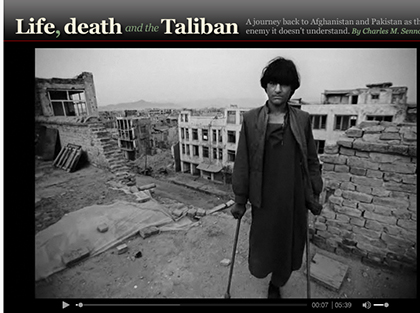A year ago, GlobalPost launched online with an ambitious mission to “redefine international news for the digital age…with a decidedly American voice.” The idea was to hire freelance stringers around the world to report back to the U.S., and thereby fill the gap left by the closure of traditional media’s foreign bureaus. While the site has forged important partnerships with CBS News and others, its hybrid business model of online sponsorships and a paid premium service has been slow to gain traction.

When I spoke to GlobalPost CEO Phil Balboni last year, he was confident that an online-only news operation could be leaner than a legacy one. “We can do it on the web, where we can reach our audience very inexpensively and [we’ve developed] a business model that allows us to be profitable without having to jump over the moon,” he told me.
One year later, Balboni said he is proud of the work done by the army of GlobalPost correspondents in 50 countries, including World of Trouble, a massive report on the global economic crisis that included work from 20 correspondents. The site also broke the story that U.S. military aid to Afghanistan was helping enrich the Taliban.
“I think we succeeded in our first year by bringing back great international coverage, with extraordinary reporting,” Balboni said. “We now have a legion of freelancers, and have had 4 million unique visitors in all of 2009. Our goal was to hit 600,000 monthly visitors to our site, and we exceeded that with 750,000 visitors last November, and 618,000 visitors in December.”

Balboni was also happy with the growing number of syndication partners for GlobalPost’s content. Last September, GlobalPost announced a partnership with CBS News that has brought in more exposure and pay for its correspondents, some of whom have been featured on the “CBS Evening News.” Not only did Balboni promise to be a non-partisan outlet, he delivered with partnerships with outlets across the political spectrum, from Huffington Post to Reuters to Newsmax. GlobalPost headlines are even featured on Fox News commentator Bill O’Reilly’s home page.
Seth Kugel, a GlobalPost correspondent based in Brazil, told me the CBS News partnership paid dividends for him.
“I have made a decent amount of money from the partnership with CBS, which shows that they are being pro-active about getting us opportunities with their partners,” Kugel told me via email. “I really feel GlobalPost understands reporters and does everything they can to support us, within their limited means.”
Business Model Challenges
While the site has established itself as a player in the news business in its first year, it has also struggled to bring in steady revenues from its premium Passport service, which has just 400 subscribers. The site initially planned to charge $199 per year for access to special content from correspondents and inside information. The price is now down to $99 per year, with a discounted $50 rate for seniors or academics.
Balboni told me Passport members especially liked being included in the story-making process via a feature called “Foreign Desk” that allows them to suggest topics and story ideas to editors. But he also said GlobalPost did not meet its revenue goals in its first year, hitting the same wall as other media companies during the economic meltdown. Balboni said GlobalPost is revamping Passport and will announce something on that front in the spring.
So far, Balboni said advertising is bringing in about 70 percent of revenues, with syndication deals and Passport bringing in 30 percent. He hopes the split will move closer to a more ideal 50/50. “The less dependent we are on ads, the better,” he said.
Steve Safran, editor in chief of Lost Remote, has worked with Balboni in the past as a consultant to GlobalPost and at Balboni’s previous venture, the New England Cable News network. Safran says Balboni succeeded in establishing GlobalPost as a respected news site.

“GlobalPost has had a successful first year by any measure,” Safran told me via email. “I dare say that this, its second year, will be even more critical. This is when we’ll see if the the site and its reporting can keep growing to a point where it’s clear whether this is a successful business model.”
Alan Mutter, a media consultant and Newsosaur blogger, was also impressed with the ambition, scope and seriousness of GlobalPost, but took issue with the tone and content.
“The work typically is solid, but often prosaic and seldom distinguished,” Mutter said via email. “You can get more up-to-the-minute news at Google News and many of the articles seem to lack the political, economic and strategic insight that characterizes the best of foreign reporting…I suspect they will get better and find their voice as time goes on.”
Support for Correspondents
One of the challenges for GlobalPost is keeping its corps of freelance correspondents happy. The correspondents receive stock options in GlobalPost, as well as about $1,000 per month to produce one 800-word reported piece per week in addition to blog-like “Notebook” entries. That pay is not nearly enough to cover living expenses for most correspondents, who must field other full-time or freelance gigs to survive.

Jean MacKenzie is the GlobalPost correspondent in Afghanistan who broke the story on U.S. aid going to the Taliban. She told me via email that the exposure she’s received while being a correspondent for GlobalPost has been satisfying. But she had to run an NGO that trains journalists in Kabul in order to make enough money.
“I have relished being a reporter again, and I believe that having to produce my own stories has made me a better trainer as well,” she said. “The downside, of course, is the lack of adequate financial compensation, which keeps me from being able to devote as much time as I would like. In order to live and work in Kabul, which is a surprisingly expensive environment, I have to have a full-time job in addition to GlobalPost. That makes things a bit frustrating, since I sometimes cannot get as deeply into the story as I would otherwise.”
Kugel, the Brazil correspondent, also has to juggle other freelance writing work with his GlobalPost reporting. Kugel said he would appreciate getting paid more, though he’s thankful that the company has covered some expenses, in addition to the extra work for CBS News.
“Of course, I would like to be paid more, and there have been times where I’ve put in many days on a story and realized that my hourly pay was something god-awful,” he said. “But most stories are not like that, and these days [GlobalPost] has gotten much more flexible about allowing us to do major projects that pay more, and give us expenses to work with…I should note that no one can live off what GlobalPost pays, but that is part of the model: we’re freelancers that devote ourselves part-time to GlobalPost.”
David Carr, media reporter for the New York Times, is amazed by the diversity and quality of the content at GlobalPost, but worries that correspondents who come from legacy media backgrounds might not be able to pass the torch to a new generation of seasoned reporters.
“Many of the best people who file on GlobalPost are correspondents who gained years or even decades of experience while living in far-flung lands on the nickel of MSM outlets,” Carr told me via email. “Those operations now find themselves in reduced circumstances and as a result have cut their global news efforts and the people who make it happen…I’m thrilled to still be reading the work of many of them, but once that generation of talent that was sustained and educated under an old media paradigm peters out, where will the talent come from?”
While GlobalPost has done a good job establishing its credentials as a serious, non-partisan news organization, it still has work to do in exploiting the online medium. Balboni said they had plans to integrate Facebook more deeply into the site, the way that Huffington Post has. And while they have increased video reports to at least two on-location reports per week, the videos are still not embeddable.
[CORRECTION: GlobalPost’s Richard Byrne pointed out that the videos are indeed embeddable, with a “Share” button at the top left part of the video. I stand corrected, though it could be designed a bit better to make that more obvious.]
“In many ways, GlobalPost piggy-backs on other organizations, since a correspondent is forced to use resources from other jobs (Internet, housing, drivers, translators, etc.),” MacKenzie said. “This is not exactly fair. But as I have said, these are teething problems that will have to be worked out if the organization is to progress. GP will have to have dedicated reporters, not stringers who have to chase a million other gigs in order to survive. For now, we are all feeling our way forward — can this new model work? If it does, it is an exciting step for journalism.”
*****
What do you think about what GlobalPost has accomplished in its first year? What do you think it could improve, and would you be willing to pay for a premium membership? Share your thoughts in the comments below.
Mark Glaser is executive editor of MediaShift and Idea Lab. He also writes the bi-weekly OPA Intelligence Report email newsletter for the Online Publishers Association. He lives in San Francisco with his son Julian. You can follow him on Twitter @mediatwit.


Excellent post Mark.
I’m rooting for Global Post. I can only imagine how tough it must be.
I forget – how much VC money did they get to start? I think it was in the millions – that must be enough to last a few years while they ramp up…
Thanks, Dave. They raised $8.2 million in seed money from 14 individual investors before launching last year. I don’t think their plan is to be profitable for a few years, so they are taking a much longer view on the business model. We’ll see what happens.
Thanks for your thorough update on GlobalPost, Mark. I joined Passport in the course of researching GlobalPost during my Shorenstein Fellowship and found a lot to like, especially for those who join for professional reasons. I took part in a couple of conference calls with correspondents (a benefit of Passport membership), and found them an intriguing way to get an insiderish feel for news. I followed up after one of the calls with a financial advisor I’d been on the line with during the chat with Dubai correspondent Tom Hundley. He explained how he’d make use of the conversation with his clients, and it was clear that Passport has become a no-brainer, gotta-have, quite inexpensive professional tool. Passport seems to offer less to customers with simply a personal, rather than expense-account, interest. All of which led me to speculate in my Shorenstein paper that GlobalPost might want to segments its audience for Passport into personal as well as professional services.
– Bill
Hi Mark, good work on the post. Would you say GlobalPost’s business model is one that can be followed by media companies hoping for improved “hyperlocal” reporting in the US?
Where GlobalPost really falls down and it has never publicly explained why is this: it puts news from Taiwan, a free and independent nation, in some imaginary place called “China and its neighbors”, while giving Japan and South Korea their own news spots. Taiwan does not get it own spot, but gets lumped in with communist China. I personally emailed the owners and editor of GP and they never once replied to me, and the PR guy just gave me a BS answer. If GP cannot get its geography right, then it is not worth the paper it is printed on. Oops. Pixels it imprinted on. wake up, Global Post and stop brownnsoing communist China. Taiwan is not part of China and never was. And worst of all, you know that!
The editors never replied to me re this: “In Elizabeth Jensen’s very good news report about a new online
newspaper called the GlobalPost (“News startup’s business model:
making money”, page 9, March 29, 2009), she neglected to mention one very
important thing about the Boston-based website. The news site classifies Taiwan as part of
some place called “China and Its Neighbors” — although neither South
Korea nor Japan or Vietnam are listed in that category. Those countries
get their own country listing. Taiwan is simply lumped in with “China
and Its Neighbors” (meaning Hong Kong and Macao).
Jensen missed a good chance to ask the editors of the GlobalPost just
who they think they are kidding by lumping Taiwan in with communist
China. The editors in Boston should take
their blinders off, and the sooner the better.”
Great post on GlobalPost and how a band of seasoned journalists broke off and formed their own gig. The $8+ million funding will help them get off the ground. The challenge will be to find a sustainable model and it appears that they might be able to that by syndicating their content. The question is how much will media companies pay for syndicating their content? It will be interesting to see what kind of sustainable and viable business model the folks at GlobalPost come up with…
Wonder if Global Post is losing out by not exploring the full potential of social media tools like Twitter and Faceboo? They can have a lively and richly interactive discussion on Twitter.
I have seen some of their in-depth pieces on Aghanistan on PBS newshour, and would love to see similar pieces on India.
What gp first has to take care of is a solid revenue creation. Social network can
Come a little bit later. Despite all the hype, social networks are not
Too great in creating income if you don’t sit at the source.
Its an important element to keep your publication alive and
Spread it but income generating is king. Otherwise it goes down as the
Internet craze where everyone was advised to go online and offer everything
For free to just not losing out on this great new “opportunity”.
In my oppinion one of the biggest mistakes of the publication world.
First make a plan of how you create income with new technology
Before you jumb blind on the band wagon.